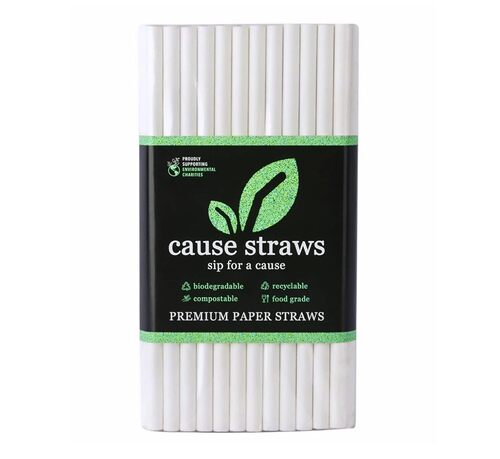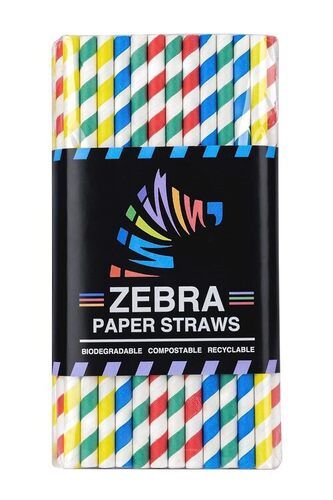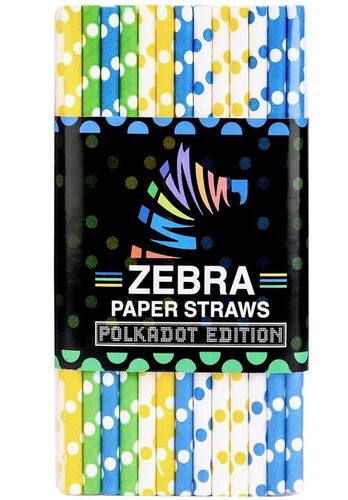Biodegradable Straws
Price 1.5 INR/ Piece
MOQ : 50000 Pieces
Biodegradable Straws Specification
- Application
- Industrial
- Product Type
- Biodegradable Straws
- Material
- Paper
- Color
- White
- Feature
- Good Quality, Smooth Texture & Environment Friendly
Biodegradable Straws Trade Information
- Minimum Order Quantity
- 50000 Pieces
- Supply Ability
- 50000 Pieces Per Day
- Delivery Time
- 1 Week
About Biodegradable Straws
Biodegradable straws are a type of drinking straw that is designed to break down and decompose naturally in the environment, typically within a shorter timeframe compared to traditional plastic straws. These straws are considered a more environmentally friendly alternative to single-use plastic straws, which can take hundreds of years to decompose and can contribute to plastic pollution.
Here are some key points about biodegradable straws:
1. Materials: Biodegradable straws are often made from natural materials such as paper, wheat, rice, bamboo, cornstarch, or various biodegradable plastics. The choice of material can impact their strength, durability, and rate of decomposition.
2. Environmental Benefits: The primary advantage of biodegradable straws is their reduced environmental impact. When disposed of in a proper waste management system, they can break down naturally and return to the environment as organic matter, without leaving behind harmful microplastic particles.
3. Use Cases: Biodegradable straws are commonly used in restaurants, cafes, and other food service establishments as a sustainable alternative to plastic straws. They are also available for personal use at home.
4. Disposal: Proper disposal is crucial for biodegradable straws to decompose as intended. They are often compostable and should be disposed of in a compost bin or sent to a commercial composting facility. If they end up in a landfill or as litter, their biodegradability may be hindered.
5. Durability: Biodegradable straws may not be as durable as traditional plastic straws and can sometimes break or become soggy when used for extended periods. However, advancements in biodegradable materials have improved their strength and durability.
6. Regulations: Some regions have regulations and standards governing the labeling and marketing of biodegradable products to ensure they meet certain environmental criteria. It's important to check for certifications and compliance with local regulations.
7. Alternatives: While biodegradable straws are a more sustainable option, there are other alternatives to single-use plastic straws, such as reusable metal, glass, or silicone straws. These alternatives can be washed and used multiple times, reducing waste even further.
FAQ:
1. What are biodegradable straws?
Ans: Biodegradable straws are drinking straws made from materials that can naturally break down and decompose in the environment. They are designed to be a more environmentally friendly alternative to traditional plastic straws.
2. What are biodegradable straws made from?
Ans: Biodegradable straws can be made from various materials, including paper, wheat, rice, bamboo, cornstarch, or biodegradable plastics. The choice of material impacts their durability and rate of decomposition.
3. How long does it take for biodegradable straws to decompose?
Ans: The time it takes for biodegradable straws to decompose can vary depending on the material and environmental conditions. Generally, they break down much faster than plastic straws, typically within a few months to a couple of years.
4. Are biodegradable straws compostable?
Ans: Many biodegradable straws are compostable and should be disposed of in a compost bin or sent to a commercial composting facility. Composting helps ensure they decompose properly.
5. Can biodegradable straws be recycled?
Ans: Recycling options for biodegradable straws can be limited, as they are often designed to break down naturally. It's essential to check with your local recycling program to see if they accept these straws.
6. Are biodegradable straws as durable as plastic straws?
Ans: Biodegradable straws may not be as durable as plastic straws and can become soft or break down if left in liquid for extended periods. However, advancements in materials have improved their strength and durability.
7. Where can I find biodegradable straws?
Ans: You can find biodegradable straws in many restaurants, cafes, and eco-conscious stores. They are also available online through various retailers and e-commerce platforms.
8. How can I dispose of biodegradable straws properly?
Ans: To ensure proper decomposition, dispose of biodegradable straws in a compost bin or send them to a commercial composting facility. Avoid throwing them in the trash or as litter, as this can hinder their biodegradability.
9. Are there any regulations or certifications for biodegradable straws?
Ans: Some regions have regulations and standards for biodegradable products to ensure they meet specific environmental criteria. Look for certifications like "compostable" or "biodegradable" to ensure they meet these standards.
10. What are the alternatives to biodegradable straws?
Ans: Alternatives to biodegradable straws include reusable straws made from materials like metal, glass, or silicone. These can be used multiple times, reducing waste even further.
11. Do biodegradable straws cost more than plastic straws?
Ans: Biodegradable straws can be more expensive than traditional plastic straws due to the cost of the materials and production processes. However, prices may vary depending on the type and quantity you purchase.

Tell us about your requirement

Price:
Quantity
Select Unit
- 50
- 100
- 200
- 250
- 500
- 1000+
Additional detail
Mobile number
Email
More Products in Drinking Straw Category
Paper Drinking Straw
Price 1.5 INR / Piece
Minimum Order Quantity : 5000 Pieces
Product Type : Paper Drinking Straw
Feature : Good Quality, Smooth Texture & Environment Friendly
Application : Industrial
Color : Multicolour
Compostable Straws
Price 1.5 INR / Piece
Minimum Order Quantity : 5000 Pieces
Product Type : Compostable Straws
Feature : Good Quality, Smooth Texture & Environment Friendly
Application : Industrial
Color : Multicolour

 Send Inquiry
Send Inquiry




 Send Inquiry
Send Inquiry Send SMS
Send SMS Call Me Free
Call Me Free English
English Spanish
Spanish French
French German
German Italian
Italian Chinese (Simplified)
Chinese (Simplified) Japanese
Japanese Korean
Korean Arabic
Arabic Portuguese
Portuguese